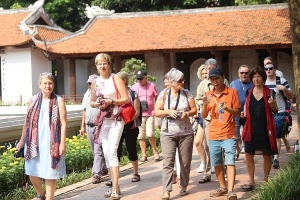Hanoi to promote 16 medicinal plant varieties for cultivation
According to statistics from Hanoi Agriculture Department, the city has approximately 250 hectares of medicinal plant cultivation, primarily concentrated in districts including Soc Son, Phu Xuyen, Dong Anh, Son Tay, Quoc Oai, Chuong My, and Ba Vi.
Hanoi's 16 key medicinal plants varieties include honeysuckle, holy basil, sweet wormwood, thai basil, mint, chrysanthemum, turmeric, and ginger.
Soc Son and Ba Vi districts, with their forested areas and suitable climate conditions, are ideal for medicinal plant development.
In Ba Vi district, there are currently over 500 rare and endemic medicinal species. Do The Loc, vice president of the Vietnam Orientally Traditional Medicine Association, said, "Ba Vi's ethnic medicinal plants are highly valuable and have been proven effective in treatment."
 |
According to Dang Van Yen from Xuan Giang commune, Soc Son district, his family cultivates 7ha of medicinal plants. "These plants are grown under the supervision of the Soc Son Medicinal Plant Conservation and Development Cooperative. The cooperative provides seedlings, offers technical guidance, and purchases the entire product. As a result, medicinal plants generate high economic value, reaching at least $16,600 per ha annually, three times that of other crops," said Yen.
Nguyen Thi Tuyen, director of the Soc Son Medicinal Plant Conservation and Development Cooperative said, “Currently, the cooperative has successfully expanded and established an organic medicinal plant cultivation model. Many of the cooperative's processed products are even exported to Japan and highly regarded in the Japanese market.”
Last year, the Hanoi Agricultural Promotion Centre supported the development of a 3ha medicinal plant. The cooperative received half of the seedlings from 400,000 plants per ha and half of the fertilisers and other supplies. The cultivation results achieved a yield of 8.5 tonnes of fresh products per ha, with a selling price of $23,716 per tonne of dried products, resulting in a profit of around $8,894 per ha after expenses.
Despite the many advantages, the development of medicinal plants in Hanoi remains fragmented and sporadic, unable to fully leveraging its strengths and potential. The medicinal plant development in Hanoi is not yet linked to processing and production, primarily selling raw materials, which results in low efficiency.
Regarding this issue, Nguyen Manh Phuong, deputy director of Hanoi Department of Agriculture and Rural Development, said, "Hanoi will support the development of medicinal plant models linked to product consumption. Specifically, the city will support the formation of specialised cultivation areas for medicinal plants that meet international standards in regions with suitable soil and climate conditions."
According to Phuong, Hanoi is directing a comprehensive review and detailed construction of specialised production areas for each medicinal plant species in each commune, coupled with establishing a system for purchasing, preserving, preliminary processing, processing, and selling medicinal plant products. This approach is based on exploiting geographical location and natural condition advantages.
The city is also aiming to convert low-efficiency crop areas in suitable locations to medicinal plant cultivation following a value chain approach, with deep processing to create high-value medicinal products linked to tourism development and new rural construction.
 | Hanoi targets stronger branding for OCOP range Hanoi is aiming to elevate its OCOP (One Commune, One Product) offerings into a recognisable brand among domestic and international consumers. |
 | Hanoi farms over 100 pomelo producing areas Hanoi currently has 7,840 hectares of pomelo cultivation, forming and developing 114 concentrated, large-scale production areas. |
 | Hanoi prioritises development of public green spaces Hanoi is set to invest in the construction of 16 thematic parks to tackle the growing shortage of green spaces within the city. |
 | Hanoi to strengthen presence on global tourism map Amid its consistent recognition at international tourism awards, Hanoi is rolling out various initiatives to solidify its standing on the global tourism map. |
What the stars mean:
★ Poor ★ ★ Promising ★★★ Good ★★★★ Very good ★★★★★ Exceptional
Related Contents
Latest News
More News
- Opening remarks of 14th National Party Congress (January 20, 2026 | 09:44)
- Vietnamese youth support 14th Party Congress with nationwide flag raising (January 20, 2026 | 09:37)
- Deputy Foreign Minister meets int’l journalists covering 14th National Party Congress (January 20, 2026 | 09:19)
- 14th National Party Congress convenes preparatory session in Hanoi (January 20, 2026 | 09:12)
- 14th National Party Congress opens preparatory session in Hanoi (January 19, 2026 | 17:42)
- National Convention Centre ready for 14th Party Congress (January 19, 2026 | 12:05)
- Key highlights of 14th National Party Congress (January 19, 2026 | 09:00)
- First working day of 14th National Congress of Communist Party of Vietnam (January 19, 2026 | 08:54)
- 14th National Party Congress – significant moment for Vietnamese people, international friends (January 18, 2026 | 18:00)
- 14th National Party Congress expected to shape Vietnam’s path to 2045 (January 17, 2026 | 16:00)

 Tag:
Tag:





















 Mobile Version
Mobile Version